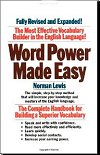

| Book of the Month | ||
 |
Word Power Made Easy |  |
Publisher: Pocket Books
Author: Norman Lewis
$7.99
ISBN 978-0671741907
It is not often that the opening pages contain the firm instruction 'Do not read this book!' But that's the first line in this classic vocabulary-building text. Actually the author does want you to read his book, but he also wants you to write in it, argue with it, and occasionally abandon it to read things in other books. He particularly wants you to talk to the book, because an important part of learning vocabulary is to say each word out loud. In short, this book does not teach vocabulary - it wants you to make the effort to learn it, and provides a valuable set of tips and techniques for doing so. Therefore this is not just a textbook. It also contains exercises, tests and space for the reader to add personalized notes. This is a book written by someone who is passionate about vocabulary, and wants you to share his enthusiasm. So there are no (well, few) lists of words to be memorized, and instead a number of ways by which words are made memorable.
The book is divided into three main parts, each of which is divided into chapters, which have some splendid titles including 'How to Insult Your Enemies'. There are further sub-divisions called 'sessions'. It appears that you are meant to do each session as a whole without interruption, and every chapter has three or four of these. A session will introduce you to a root - for example 'bene' ('good' in Latin) - and then take you through the various ways that words are formed from this root. For example 'bene' gives us 'benign' - something not harmful, 'benevolent' - wanting good for someone, and 'benefactor' - one who does good. Once you know these words, and know that 'male' in Latin means 'evil', you can construct for yourself the words 'malign', 'malevolent', and 'malefactor' and immediately understand their meanings.
The book also has 'Brief intermissions' which are about ways of using vocabulary which do not fit into the overall plan of the book, but that the author wants you to know anyway. These have titles which reflect the variety of topics which the intermissions cover - e.g. 'Random Notes on Modern Usage' and 'How to Speak Naturally'. Speaking is an important part of this book. Almost every word is introduced together with a guide to its pronunciation, and the author explains why one should be neither inarticulate nor incoherent (and then explains the difference between these two words). Overall, this book is intended to make the student work hard, but the author appears to be having fun taking the reader through it all, and his enthusiasm is contagious. Examples are never dull, and every new word is quickly followed by exercises to help you understand the meaning and pronunciation. The final chapter is a short essay urging readers to keep exploring and expanding their English vocabulary. There is no final index - why do you need one when you should now know all the words? - and the only appendix is a not-very-useful list of strange phobias. (If you have a phobia about everything, this is 'pantophobia'.) There are no illustrations.
Who is this book for? Anyone who needs to write or speak fluently or persuasively can find valuable information here, whether a student or native speaker of English. This book requires work, especially for non-native speakers who might struggle occasionally with the vocabulary and idioms used by the author, but the book is laid out in a manner which makes it possible to study for just a few minutes a day, if that is what you want. This is not a dictionary or a thesaurus, but it will greatly help readers to understand, appreciate and use the words these other books contain. As the author this book says, this book is for those who want 'to build a superior vocabulary'.
Verdict: Hard work, but worthwhile
Assessment 7/10